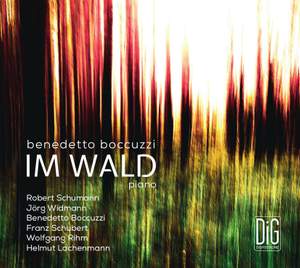Romantics Robert Schumann and Franz Schubert with that of the contemporaries Jörg Widmann, Wolfgang Rihm and Helmut Lachenmann, showing, through a play of reflections and an intergenerational aesthetic dialogue, a multifaceted and "augmented" reality. In the programme, divided into two parts as if they were two Lieder cycles without a singer, the listener/wanderer, accompanied by the detailed and precious narration offered in the booklet by music historian Benedetta Saglietti, is invited to ex-plore an imaginary enchanted forest where reality is repeatedly torn apart by uncanny fantastic hallucinations. In the first half of the album Robert Schumann's nine Forest Scenes (1849) are punctuated by five of the Eleven Humoresques (2007) by Jörg Widmann. The second half is based on a selection of seven Lieder from Franz Schubert's Fair Maid of the Mill (1824) (in August Horn's essential piano transcription), which are commented on first by Wolfgang Rihm's dreamlike Ländler (1979) and then by Helmut Lachenmann's Five Variations on a theme of Franz Schubert (1956). The transition between these two cycles is provided by Boccuzzi's interlude for solo electronics Im Wald (2022). In this piece, conceived as the soundtrack to an imaginary short film inspired by the fantastic visions evoked by the Romantic writer Ludwig Tieck, the piano is first "timbrically extended" and then "filtered through electronics", revealing a new acoustic space. The programme is multidimensional: the interaction between the real and the fantastic, already present in the poetics of Romantic composers, is "augmented" by the hallucinatory visions of contemporary composers and finally extended further through the electronic acoustic space.



